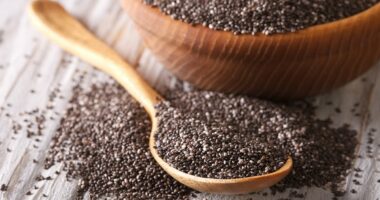Share this @internewscast.com
A neuroscientist has detailed five everyday foods that could cause “damage” to our brain’s inner workings and structure. The proverb “you are what you eat” rings true, highlighting the significant impact our dietary choices have on both our physical appearance and internal well-being.
There’s an array of online content which delves into the influence our diets have on our bodies, as well as the health of our brain. Many nutrition experts have taken to platforms like TikTok to offer their guidance on crafting healthy meals that are beneficial for both body and psyche.
Dr Ramon Velazquez, a consultant and research advisor at Mind Lab Pro, has chimed in with insights about how certain foods could affect cerebral capacity.
Dr Velazquez cautioned: “The damage from poor dietary choices accumulates silently over decades. The foods you eat in your 30s and 40s set the stage for how your brain will function in your 60s, 70s, and beyond.”
He pointed out several common foods in our diets that may be doing more harm than good, warning that ongoing consumption could potentially lead to memory issues and a deterioration in cognitive faculties as we age. While moderation is the key to a healthy and varied diet, heeding the advice that follows might just be the ticket to a fitter mind and body.
Ultra-processed foods
While ready meals and processed snacks may be a quick fix, they’re often packed with additives, preservatives, and artificial ingredients that could lead to a host of health problems.
Dr. Velazquez warned: “Studies have found that people who consume the highest amounts of ultra-processed foods have a 28% faster rate of global cognitive decline.
“These foods trigger inflammatory responses that damage the delicate connections between brain cells.”
Instead, it might be wise to choose whole foods that haven’t been heavily processed, such as fresh fruits, vegetables, and unprocessed meats.
High-mercury fish
Fish is frequently hailed as a brain booster due to its omega-3 content, but there are some types that prove risky.
Larger predatory fish that typically live longer – like shark, swordfish, king mackerel and tilefish – can contain high levels of mercury, a neurotoxin which may accumulate in the body over time.
Dr. Velazquez said: “Mercury is particularly damaging to neural tissue because it can cross the blood-brain barrier. Once inside the brain, it disrupts cellular function and can lead to cognitive impairment over time.”
Foods with high levels of advanced glycation end products (AGEs)
Charred foods may be tempting, especially during barbecue season, but the browning process creates compounds known as Advanced Glycation End-Products (AGEs).
These compounds, known as AGEs, are formed when proteins or fats combine with sugars, especially during high-temperature cooking methods such as grilling, frying, or broiling. “AGEs trigger oxidative stress and inflammation in the brain,” explained Dr Velazquez.
“They’ve been linked to the development of amyloid plaques – the same protein deposits found in Alzheimer’s disease.”
He recommends opting for cooking methods like steaming, poaching, or stewing, which produce fewer AGEs.
Despite Dr Velazquez’s advice, many experts, including chef Eva De Angelis, LDN, believe it’s all about balance. Speaking to EatingWell, she said: “It’s more important [to focus on] your overall dietary pattern than isolated foods.
“As a general rule, if you have a balanced diet rich in foods high in fibre, protein and healthy fats with a reduced intake of processed and red meat, and foods high in sugar, fat and salt, having the occasional burnt food is okay.”
She added: “There’s no denying that charred food tastes good, and it’s part of many flavourful dishes and meals. Yet, I try to eat them only on occasion. This way I can enjoy them without putting myself at risk of increasing the chances of chronic diseases.”
Artificial sweeteners
On the topic of artificial sweeteners, Dr. Velazquez said: “Recent studies suggest that certain artificial sweeteners can alter gut bacteria in ways that may promote inflammation. This inflammation can affect cognitive function and potentially increase the risk of neurodegenerative disorders.”
Instead of reaching for artificial sweeteners, natural alternatives like honey or maple syrup could be worth a go. It’s also beneficial to try to gradually reduce your sweet tooth by slowly cutting back on these.
Excessive alcohol
While many Brits enjoy a tipple to unwind, excessive alcohol can wreak havoc on the brain. Dr Velazquez said: “Long-term heavy drinking causes the brain to shrink in volume.
“It particularly affects the prefrontal cortex, the area responsible for decision-making and rational thought.” So if you do indulge, moderation is key.
The neuroscientist highlighted that while the brain is “incredibly resilient”, it’s also “vulnerable” to the effects of inflammatory foods.
He warned harmful foods “interact with genetic risk factors”, meaning those with a family history of dementia or Alzheimer’s could see the “onset of symptoms” rapidly “accelerated” by “poor dietary choices”.
He concluded: “This is why nutrition needs to be a cornerstone of any brain health strategy, alongside exercise, sleep, and mental stimulation.”















